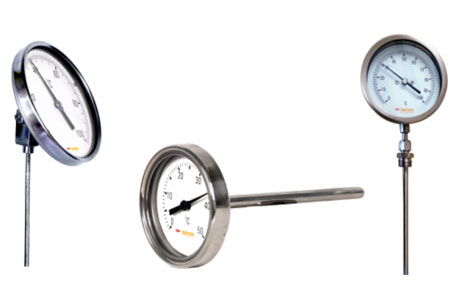What Are The Industrial Applications Of Temperature Gauges?
Key Takeaway
Temperature gauges play a key role in many industrial processes, ensuring the proper functioning of equipment and products. In manufacturing, they monitor heat and cooling systems, preventing overheating and improving process efficiency. In food production, temperature gauges are critical for maintaining food safety during cooking, cooling, and storage.
Additionally, temperature gauges are vital in industries like HVAC, chemical processing, power generation, and pharmaceuticals. In HVAC systems, they help optimize energy usage and prevent system failures. In chemical and power plants, precise temperature control is essential for ensuring safety and maintaining desired reaction rates. These gauges ensure that processes run smoothly and safely across various industries.
Introduction to Industrial Temperature Measurement
Temperature measurement is an essential component in industrial settings, ensuring that processes run smoothly, safely, and efficiently. In industries where precision is key, temperature control plays a critical role in product quality, safety standards, and operational efficiency. Temperature gauges are invaluable tools used to monitor and regulate heat levels across a range of applications. These devices are used in everything from large-scale manufacturing plants to sensitive food processing environments, ensuring that systems maintain optimal conditions. In addition, temperature gauges help detect anomalies, prevent overheating, and provide data for continuous improvement.
Accurate temperature monitoring helps prevent costly equipment failures, improves production quality, and ensures safety compliance. Given the vital nature of temperature in many industrial applications, it is essential to choose the right type of gauge to meet specific requirements. Understanding the varied industrial uses of temperature gauges highlights their role in keeping operations running smoothly across multiple sectors.

Applications in Manufacturing Industries
In manufacturing, temperature gauges are used extensively to monitor and control various processes such as metal forging, casting, welding, and plastic molding. These processes often involve high temperatures, and precise control is crucial to maintain quality and prevent defects in the final product. For instance, in the production of metals and alloys, maintaining the correct temperature ensures the proper melting point is reached for effective casting and avoids overheating that could lead to the degradation of materials.
Furthermore, temperature gauges are used to track the temperature of machinery and equipment, helping prevent overheating that could cause breakdowns or inefficient operation. In many cases, temperature data is logged and analyzed to optimize production processes and improve efficiency. Whether it’s controlling the temperature of an industrial furnace or ensuring that plastic products are molded correctly, temperature gauges are a critical part of maintaining quality and safety in the manufacturing industry.
Applications in Food Processing
The food industry relies heavily on precise temperature control to ensure product quality, safety, and compliance with health standards. Temperature gauges are used in various stages of food production, from cooking and pasteurization to refrigeration and storage. Maintaining the correct temperatures during these stages is crucial to preserving the flavor, texture, and safety of the food. For example, in pasteurization, food must be heated to a specific temperature to kill harmful bacteria without compromising the integrity of the product.
Temperature gauges also play a significant role in refrigeration and cold storage. They help monitor temperatures in warehouses, storage units, and transport vehicles, ensuring that perishable items remain at the required temperature to avoid spoilage. Additionally, food processing plants use temperature gauges to regulate cooking equipment, ovens, and fryers, ensuring that food is cooked to the correct temperature while maintaining taste and nutritional value.
Applications in Healthcare and Pharmaceuticals
In healthcare and pharmaceuticals, temperature control is critical to ensuring the safety and efficacy of medicines, vaccines, and patient care. Temperature gauges are used to monitor the storage conditions of sensitive pharmaceutical products that require precise temperature ranges to maintain their potency and safety. For instance, vaccines and insulin must be stored at specific temperatures, and temperature gauges ensure that these products are kept within their required ranges during storage and transport.
Moreover, temperature gauges are essential in medical devices, including incubators, sterilizers, and autoclaves, to ensure patient safety and the proper functioning of equipment. In hospitals, temperature gauges are also used to monitor environmental conditions such as room temperatures in critical care areas, ensuring that patients receive optimal care. This application extends to laboratories, where temperature control is vital for experiments, preserving biological samples, and maintaining the integrity of research processes.
Emerging Uses in Modern Industries
As industries evolve, so too do the applications of temperature gauges. New technologies, such as smart sensors and IoT (Internet of Things)-enabled devices, are allowing temperature gauges to provide more than just data—they now offer real-time monitoring, predictive analytics, and integration with other systems for greater operational efficiency. These emerging uses can be seen in sectors like renewable energy, where temperature gauges monitor solar panels, wind turbines, and energy storage systems.
In the automotive industry, temperature gauges are becoming integral to electric vehicle (EV) battery management systems, ensuring that batteries maintain an optimal temperature range for performance and longevity. Additionally, temperature measurement in 3D printing processes, where temperature fluctuations can significantly affect material properties, is becoming increasingly important for ensuring precision in additive manufacturing. These modern innovations underscore the growing role of temperature gauges in adapting to the technological advancements of various industries.
Conclusion
In conclusion, temperature gauges are integral to a wide range of industrial applications, ensuring precise temperature control and monitoring. They are used extensively in sectors such as manufacturing, food processing, chemical production, and energy generation. These gauges help maintain the desired operating conditions, thus ensuring product quality, efficiency, and safety.
In industries where temperature plays a critical role in the processing of materials, accurate and reliable temperature gauges are indispensable. They contribute to efficient resource management and operational safety, preventing costly equipment failures and ensuring compliance with industry standards. As technology advances, the functionality and accuracy of temperature gauges continue to improve, further expanding their applications across various industrial domains.
